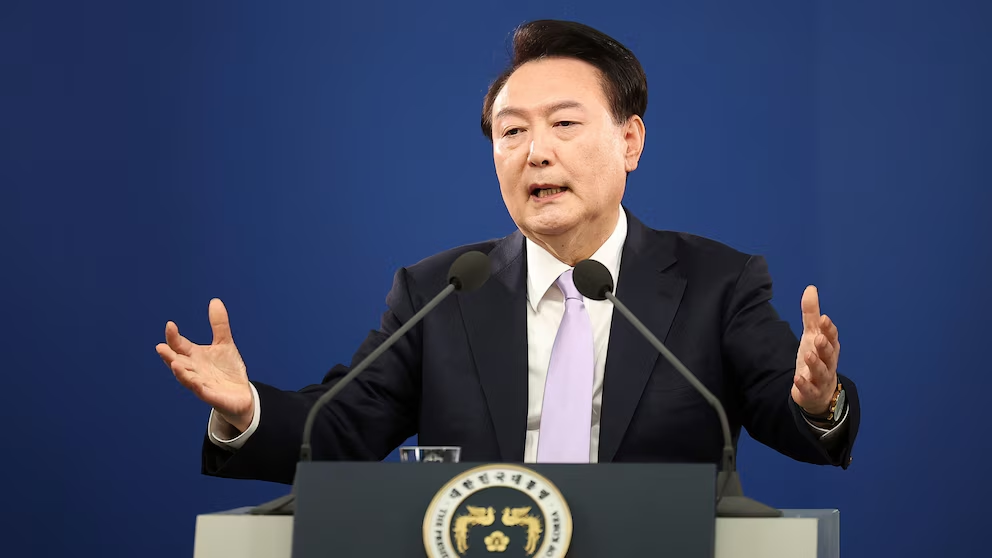Nation Faces Unprecedented Political and Security Challenges
December 3, 2024 — In an unprecedented move, South Korean President Yoon Suk-yeol declared martial law late Tuesday night, citing rising threats from “pro-North Korean anti-state forces” and a political deadlock over the national budget. This historic declaration marks the first instance of martial law in South Korea since its democratic transition in the late 1980s, sparking widespread debate and concern over its implications for the nation’s democratic principles.
President Yoon’s Announcement
In a live televised address at 10:22 PM KST, President Yoon highlighted severe threats to national security and political stability. “To protect our constitutional order and ensure the safety of our citizens, declaring martial law has become unavoidable,” Yoon stated. He accused opposition parties, particularly the Democratic Party, of obstructing governance and engaging in activities that jeopardize South Korea’s sovereignty and stability. Yoon emphasized that the measure aims to neutralize “anti-state elements” and ensure seamless governmental operations.
Implications of Martial Law in South Korea
Martial law entails the temporary suspension of ordinary law and governance, placing military authorities in control of civilian functions. In South Korea, it grants the government broad powers, including deploying troops, imposing curfews, censoring media, and limiting public gatherings. Critics argue that these measures threaten civil liberties and democratic norms.
Immediate Reactions and Developments
Military Deployment
Following the announcement, military forces were dispatched to key locations, including the National Assembly in Seoul. Soldiers quickly secured the premises, encountering resistance from parliamentary staff and protesters gathered outside. Clashes were reported as demonstrators expressed outrage over the imposition of martial law.
Public Protests
Massive protests erupted nationwide, with citizens voicing concerns about potential abuses of power. Protesters carried signs reading “Democracy Under Siege” and “No to Martial Law,” highlighting the deep divisions caused by the decision.
Political Response
Opposition leader Lee Jae-myung condemned the move as unconstitutional, urging citizens to resist what he termed “an authoritarian power grab.” Even within the ruling People Power Party, dissent emerged. Party leader Han Dong-hoon criticized the decision, stating, “This move does not align with democratic values. We must protect our institutions.”
Economic Impact
The declaration of martial law has sent shockwaves through South Korea’s financial markets. The Korean Composite Stock Price Index (KOSPI) plummeted by over 5% in early trading, with major corporations like Samsung and Hyundai experiencing steep losses. The South Korean won also weakened by 2% against the U.S. dollar, reflecting investor anxiety over the nation’s political instability. The Ministry of Finance has convened emergency meetings to stabilize markets and mitigate the economic fallout. Analysts warn that prolonged uncertainty could have long-term implications for foreign investments and economic growth.
Historical Context
This is the first time martial law has been declared in South Korea since 1979, during the authoritarian regime of Chun Doo-hwan. The military crackdown during the Gwangju Uprising in 1980, which resulted in significant civilian casualties, remains a painful memory for many South Koreans. The current declaration has reignited fears of a return to authoritarianism, with citizens drawing parallels to the nation’s tumultuous past.
International Reactions
Global leaders and organizations are closely monitoring the situation. The United States National Security Council issued a statement expressing concern and urging all parties to respect democratic principles. China, South Korea’s neighbor and economic partner, advised its citizens in the country to exercise caution and avoid political gatherings. The European Union called for dialogue to resolve the crisis peacefully.
Legal Challenges and Resolution
Under South Korean law, the president is required to notify the National Assembly immediately after declaring martial law. The assembly has the authority to annul the declaration with a majority vote. By 1:00 AM KST on December 4, an emergency session of the National Assembly voted unanimously to annul martial law, effectively terminating its enforcement.
Public Sentiment and the Future
The imposition and swift annulment of martial law have left South Korea at a crossroads. While some citizens view the president’s actions as necessary to counter security threats, many others see it as an alarming overreach of executive power. Public opinion remains deeply polarized, reflecting the broader political and social divisions within the nation. This incident underscores the fragility of South Korea’s democratic institutions and raises questions about the balance between national security and civil liberties. Moving forward, the government and opposition must work together to rebuild public trust and ensure that democratic norms are upheld.
Summary
The declaration of martial law in South Korea represents a critical moment in the nation’s history, testing its democratic resilience and political stability. As the country navigates the aftermath, both domestic and international stakeholders will be watching closely, hoping for a resolution that safeguards democracy while addressing the underlying challenges that led to this crisis.
Stay tuned for further updates on this developing story. For the latest news on South Korea’s political and economic landscape, bookmark this page.

